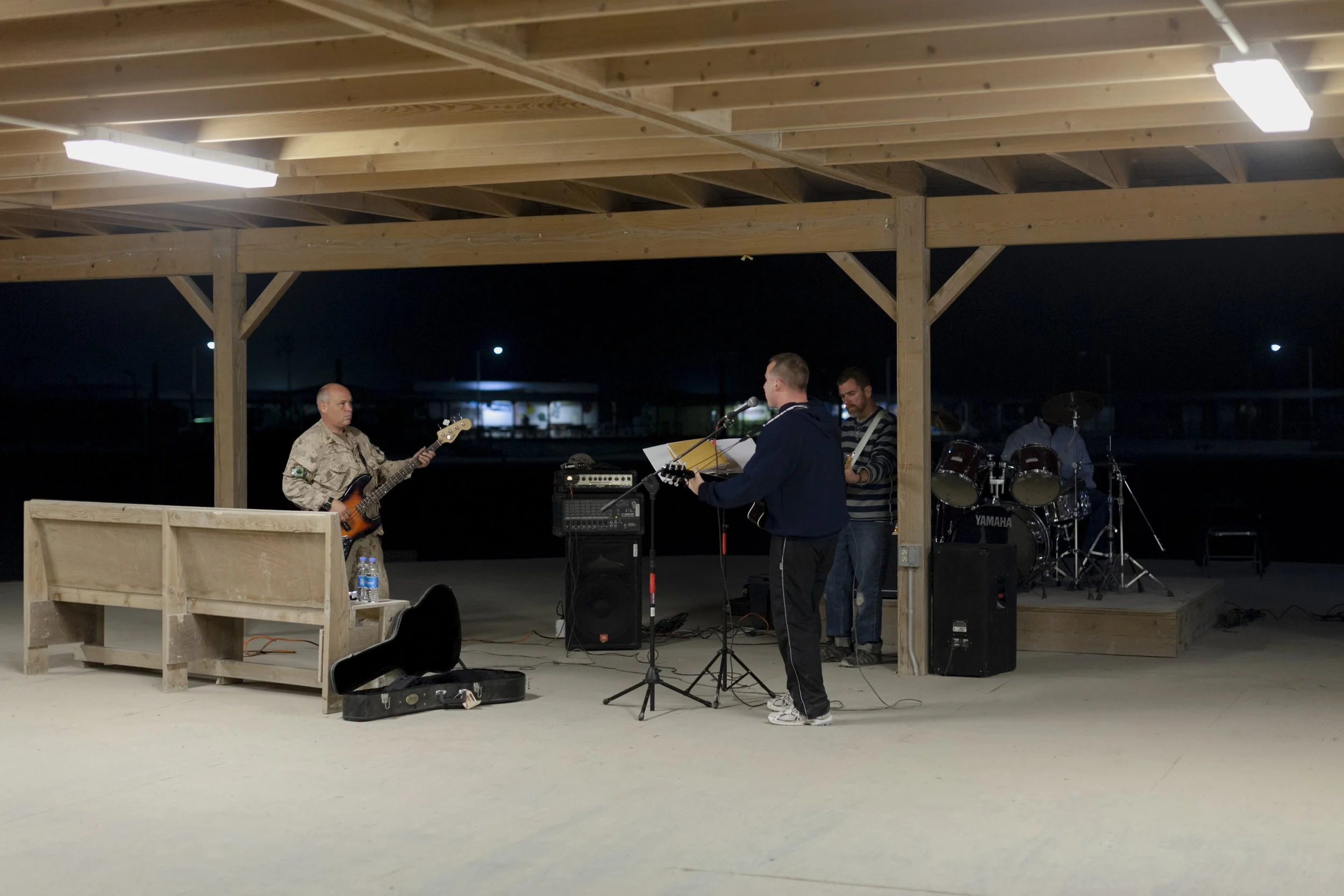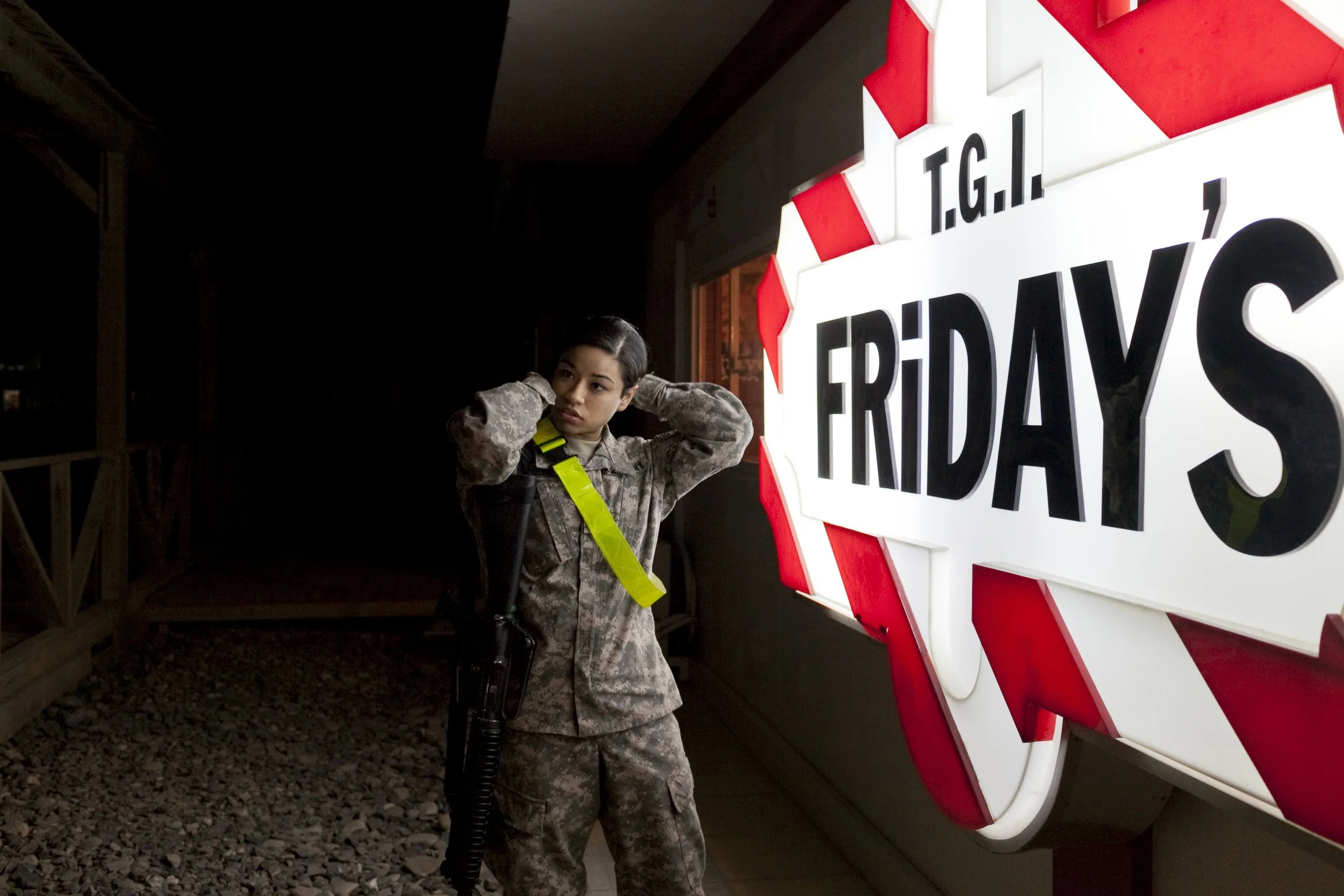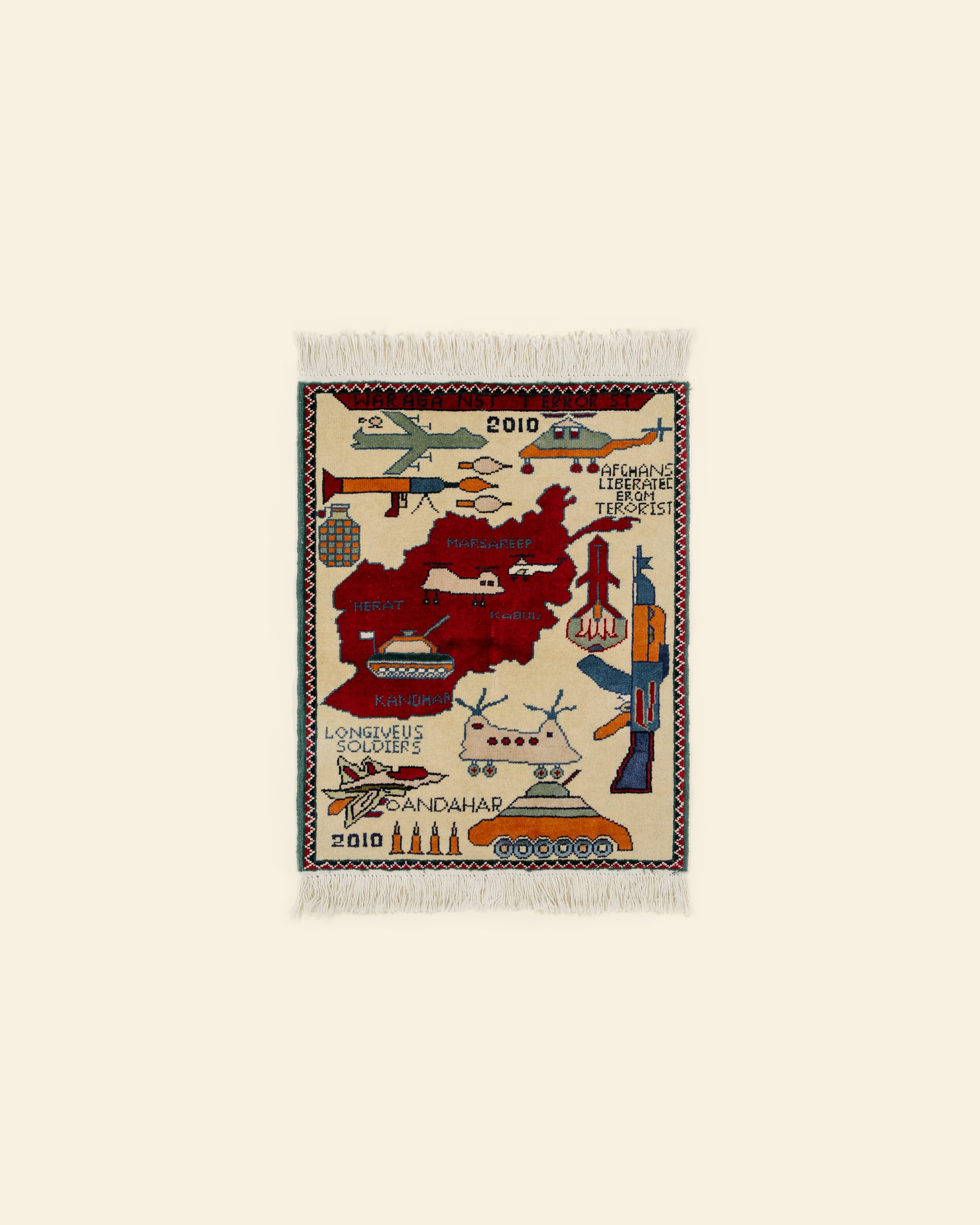Weapon Maintenance, Kandahar Airfield
New Year's Eve, Kandahar Airfield
Band practice at the Boardwalk, Kandahar Airfield
Subway Kandahar, Kandahar Airfield
Sick parade, Kandahar Regional Medical Hospital
T.G.I. Friday's, Kandahar Airfield
Chapel, Kandahar Airfield
Administration, Kandahar Airfield
Afghan interpreter, T.G.I. Fridays, Kandahar Airfield
Dental cleaning, Kandahar Airfield
Bulletin board, Kandahar Airfield
Cashier, Kandahar Airfield
American flag, Kandahar Airfield
A knockoff "Hard Rock Cafe Afghanistan" coffee mug sold in a gift shop at "The Boardwalk", the social center of Kandahar Airfield which offers Western style cafes, gift shops, restaurants and sports fields.
A "Taliban Hunting Club" T-shirt sold in a gift shop at "The Boardwalk", the social center of Kandahar Airfield, which offers Western style cafes, gift shops, restaurants and sports fields. The shirt has become popular with soldiers on the front line and their supporters back home.
Shrapnel from a rocket-propelled grenade fired by the Taliban at coalition troops during Operation Medusa in Kandahar province in 2006. At the time, it was the most significant land battle ever undertaken by NATO.
Safe Conduct Passes are typically airdropped by Psychological Operations units into populated areas prior to a military operation.
Tim Hortons camouflage cap - a highly coveted souvenir by soldiers and contractors serving at Kandahar Airfield. Since opening in Kandahar Airfield in 2006, the popular Canadian coffee shop, Tim Hortons has served four million cups of coffee, three million donuts and half a million iced cappuccinos and bagels to 2.5 million customers. After five years of serving customers from 37 different nationalities, the Tim Hortons outlet in Afghanistan closed in 2011.
A "Major League Infidel" velcro patch that replicates the Major League Baseball logo was sold in a gift shop at "The Boardwalk", the social center of Kandahar Airfield, which offers Western style cafe's, gift shops, restaurants and sports fields. The patch is often worn on a soldiers sleeve or body armour on the battlefield.
A Soviet-era pistol holster found on a Taliban position during Operation Medusa in Kandahar province in 2006. At the time, it was the most significant land battle ever undertaken by NATO.
A handmade Afghanistan war rug sold at Kandahar Airfield's weekly bazaar. The bazaar was introduced so coalition troops could shop from local traders within the safety of the base, and to provide a small cash injection to the local economy. The vendors sold many items, from counterfeit DVD's, jewelry, daggers, traditional clothing to crafts.
Operation Enduring Freedom Afghanistan Challenge Coin. A military challenge coin usually bears a unit or organization’s insignia and/or the title of a military operation. The use of challenge coins in the military is nuanced. Challenge coins are typically presented by unit commanders in acknowledgement of special accomplishment, or to prove membership in a particular unit or to those who had served as a part of a military operation.
"Afghanistan Rod & Gun Club - It’s better to give than to receive" T-shirt sold in a gift shop at "The Boardwalk", the social center of Kandahar Airfield, which offers Western style cafes, gift shops, restaurants and sports fields. The shirt has become popular with soldiers on the front line and their supporters back home.
A letter sent to a soldier in Afghanistan as a part of a care package. During the holiday season, the Army postal operations in Southern Afghanistan receives packages and letters that average between 70,000-125,000 pounds a day.
A "Laser Guided Democracy" velcro patch that was sold in a gift shop at "The Boardwalk", the social center of Kandahar Airfield, which offers Western style cafe's, gift shops, restaurants and sports fields. The patch is often worn on a soldiers sleeve or body armour on the battlefield.
The Thing About Remembering
In fall 2017, Ken Burns and Lynne Novick aired their eighteen-hour series The Vietnam War. It was clear over the ten-part story not only that an unfathomable number of lives were lost, but also that the war went on for an excruciatingly long time. Matt Zoller Seitz reviewed the series on Vulture, writing, “As you read this, the War on Terror has been going on longer than the totality of America’s involvement in Vietnam: Next week marks the 16th anniversary of U.S. troops entering Afghanistan, a conflict that’s been fought for so long that sons in uniform are walking the same trails that once bore the bootprints of their fathers.” And yet, in contrast to the protest and outrage of the Vietnam era, the ongoing conflict in Afghanistan is largely unseen; it has slid off the front page and out of America’s consciousness, especially since November 2016. This is where photographers and photographs can, and should, help redirect public attention away from the most sensational and toward the most important.
That’s just what Philip Cheung’s series The Thing About Remembering accomplishes. Cheung’s work draws the viewer into the daily life on the Kandahar Airfield in Afghanistan, reminding us that the United States is still in the midst of a war. From 2008 through 2014, Cheung examined the landscape and subculture on the base. He avoids the visual tropes of war photography, focusing more on the administrative duties of those managing combat operations and infrastructure. His portraits are surreal, as are the product pictures of ordinary objects he found on base. A knockoff Hard Rock Cafe Afghanistan mug sold in a gift store at “The Boardwalk,” the social center of Kandahar Airfield, is presented as if it’s an artifact worth close examination. Such images of T-shirts and souvenirs offer evidence of a military that has, quite literally, set up shop. They are included alongside portraits of soldiers, who often appear either frozen in the lethargy of administrative tasks or shell-shocked, stiffly going through the motions of war—we’re not sure which. A figure stands in front of a photocopier, in a darkened room, while pink light illuminates her blank face. A young woman looks determined as she works on her service rifle, reading the manual as if trying to assemble IKEA furniture.
The core of this work—and the connection between the images—lies in its overarching sense of calm, one rarely associated with war. The very banality of the tasks, the people, and the objects hints at how this conflict has become routine to society. We are bored and disconnected when we should be concerned and engaged. And yet, carried within each image is Cheung’s subtle reminder that this everyday is currently happening, today. Text by Amelia Lang for the Aperture Portfolio Prize 2018
























